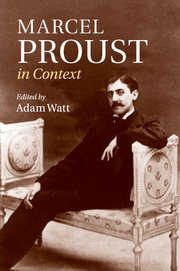Book contents
- Frontmatter
- Contents
- List of Illustrations
- Notes on contributors
- Figure I. Marcel Proust, portrait in oils by Jacques-Émile Blanche, 1892
- Preface
- Figure 2. Proust photographed on his death-bed by Man Ray, 1922
- Note on the text
- Chronology
- Part I Life and works
- Part II Historical and cultural contexts
- i. The arts
- Chapter 6 Proust's reading
- Chapter 7 Decadence and the fin de siècle
- Chapter 8 Paris and the avant-garde
- Chapter 9 The novelistic tradition
- Chapter 10 Philosophy
- Chapter 11 Painting
- Chapter 12 Music
- Chapter 13 Theatre and dance
- ii. Self and society
- Part III Critical reception
- Further reading
- Index
- References
Chapter 12 - Music
from i. - The arts
Published online by Cambridge University Press: 05 November 2013
- Frontmatter
- Contents
- List of Illustrations
- Notes on contributors
- Figure I. Marcel Proust, portrait in oils by Jacques-Émile Blanche, 1892
- Preface
- Figure 2. Proust photographed on his death-bed by Man Ray, 1922
- Note on the text
- Chronology
- Part I Life and works
- Part II Historical and cultural contexts
- i. The arts
- Chapter 6 Proust's reading
- Chapter 7 Decadence and the fin de siècle
- Chapter 8 Paris and the avant-garde
- Chapter 9 The novelistic tradition
- Chapter 10 Philosophy
- Chapter 11 Painting
- Chapter 12 Music
- Chapter 13 Theatre and dance
- ii. Self and society
- Part III Critical reception
- Further reading
- Index
- References
Summary
Music has been one of the great passions of my life . . . It has brought me indescribable joy and knowledge, and the certitude that something exists beyond the ‘void’ with which I have struggled for so long. It runs like a guiding thread throughout all of my work.
(Marcel Proust, 1922)Had Proust never made this declaration, in an interview six months before he died, one might surely have surmised it from his work; his fascination with music is clear enough throughout his novels and his correspondence. A decade later, Samuel Beckett concluded his 1931 study of Proust with a brief reflection on the importance of music, characterizing it with a similarly dynamic and energetic metaphor – music, he said, was ‘the catalytic element’ in Proust's work. A whole book could be written on the subject, Beckett ventured and, in the eighty years since, many have been. Approached by scholars working in both literature and musicology, the topic recurs with ‘pendulum-like regularity’. But what was clear then, and remains so today, is that a few themes and approaches have remained constant. These include investigations of Proust's musical world (in terms of his own musical experiences and the wider cultural milieu), studies of the presence of music in his novels (as cultural markers for different characters and in terms of literary style) and explorations of the structural and philosophical significance of music to Proust's larger project. Though it would be foolish to say that any of these have been exhausted, there is probably little more of interest left to say on the undoubted importance of Wagner or on the somewhat pointless question of exactly which Sonata for Violin and Piano provided the model for the fictional Vinteuil Sonate that plays such an important role within À la recherche. There is still a great deal to learn, however, about what Proust's Recherche tells us about the nature of music, and what, according to Proust's account, music might tell us about time, memory and particularity.
- Type
- Chapter
- Information
- Marcel Proust in Context , pp. 90 - 96Publisher: Cambridge University PressPrint publication year: 2013
References
- 2
- Cited by

